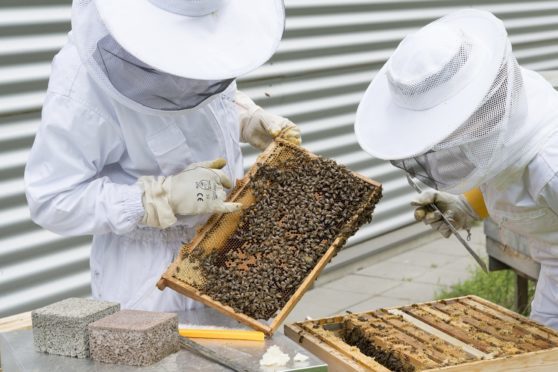Scientists have issued an appeal for samples of honey from across the north in a bid to better understand the factors which can alter honey yields and the size and health of honeybee populations.
The Centre for Ecology and Hydrology (CEH) is seeking amateur and professional beekeepers to send samples for analysis in conducting the new National Honey Monitoring Scheme.
Honey gathered and analysed under the scheme will undergo vigorous tests including the advanced technique of DNA barcoding.
Scotland possesses around 2000 amateur beekeepers with large scale farms spanning the country from Dumfries through the north and north east, to as high up as Orkney.
Professor Richard Pywell, from the CEH, said: “The vulnerability of honeybees to the way we manage land in the UK has long been a cause for concern, but it is this sensitivity that makes them potentially really important for monitoring long-term changes to the condition and health of the countryside.
“We want to work with beekeepers in Scotland and across the UK to understand where in the countryside bees have lots of crop and wildflowers to feed upon, and where they are forced to feed on only a few plant species. Similarly, we want to know what pesticides they are exposed to and where this is occurring.
“This information will help us understand some of the factors affecting the size and health of honeybee populations, and ultimately honey yields.
“It will also inform the way we might manage the countryside in future to support honeybees and wild pollinators, for example, which wildflowers and crops we might plant to augment bee diets.”
The scheme has been backed by the Scottish Beekeepers Association and will be monitored by scientists at the CEH. Scientists hope to identify the types of pollen and pesticides present in honey samples, as well as identifying some of the diseases bees are exposed to.
Alan Riach, president of the Scottish Beekeepers Association, said: “The National Honey Monitoring Scheme is a long-term project that will track the health of Scotland’s countryside through our honey samples.
“We hope our members, and beekeepers across Scotland, will sign up to provide samples so that we can contribute towards a comprehensive ‘state of the nation’ survey of Scotland’s honeybees and honey production.
“The more beekeepers who take part, the more valuable the results will be.”
